
32 minute read
Zambia Malaria elimination to be TRF’s first Programme of Scale
Zambia Malaria

Advertisement
Team Rotary News
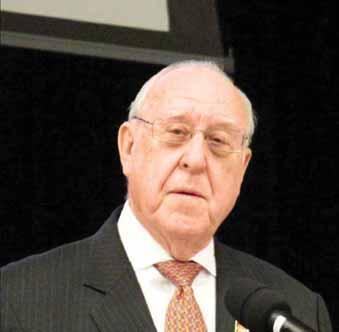
The world needs the service of Rotarians now more than ever before. It needs our courage, optimism, idealism. It needs the voice of tolerance, cooperation, and hope that we offer. It needs the example of an organisation that has proven that the citizens of all countries can work together successfully, and in friendship,” said incoming TRF Trustee Chair John Germ, addressing the International Assembly, which went virtual this year.
Mother Teresa once said, “I cannot change the world, but I can cast a stone across the waters and create many ripples.”
Reminding the incoming governors that TRF “helps each of us to do good — whether by eradicating the poliovirus, by training the next generation of peace and conflict resolution experts with the Rotary Peace Centers, or through district and global grants,” he said through global grants Rotarians are meeting local community needs across the world. “Beginning on July 1, 2021, The Rotary Foundation will accept applications for global grants funding to support projects to protect the environment.”
In order to support the growth of global grants, the Trustees are rebalancing and improving the Foundation’s long-term financial health after carefully considering many options.”
For example, operational costs had been reduced and other changes made to provide an additional $4.4 million for global grant awards, “above what was originally budgeted for this Rotary year. We have also made a number of changes to World Fund matches for next year to stretch the amount available for global grants.”
Germ said that for the year ahead, to help expand Rotary’s reach, TRF had set three priorities.
“Our first priority is, of course, to end polio.
Our second priority is to increase contributions to the Annual Fund and PolioPlus while building the Endowment Fund to $2.025 billion by 2025. To that end, we have set a comprehensive fundraising goal of $410 million.”
The break up of these goals was: $50 million for PolioPlus, which is then matched double by the Gates
Foundation to bring the total to $150 million. If every club contributed just $1,500, this goal could be surpassed. Encouraging their own districts to contribute 20 per cent of their available District Designated Funds would also provide leadership and set the pace for this programme. $125 million for the Annual Fund.
Newer members need to be introduced to Rotary’s strong culture of philanthropy as embodied in “Every
Rotarian, Every Year” slogan for the
Annual Fund. So the DGEs would need to encourage every club, and every individual in every club, to contribute to this fund. The aim is also to raise $95 million for the Endowment Fund in outright gifts and new commitments. And then $40 million for other outright gifts. All of it adds up to a grand total of $410 million.
TRF’s third priority is to improve the measurable impact of the grants. “Increasingly, Rotarians, prospective members, philanthropists, and partners want to know the measurable impact of our programmes. While the impact of PolioPlus commitments is clear, we need to move to the next level of quantifying the impact of our other programmes.”
With this priority in mind, Programmes of Scale was introduced this Rotary year. It’s a competitive grant programme to fund promising, Rotarian-led, evidence-based programmes that have already demonstrated success in effecting change. These grants support longerterm activities that last for three to five years. “Through these Programmes of Scale, we want to find new ways to learn together, accomplish our mission, and demonstrate Rotary’s power to create real change.”
After receiving and reviewing 70 proposals, a deep analysis of the top applications was completed, and the first Programme of Scale recipient was the Zambia Malaria Elimination Programme.
This programme seeks to reduce the incidence of malaria by 90 per cent in 10 target districts in two provinces in Zambia and contributes significantly to a nationwide strategy. Led by the Rotary Club of Federal Way near Seattle, Washington, RI will collaborate with several African and international partners to co-fund and implement this programme. TRF’s contribution will be $2 million, with the others contributing $4 million, for the total project cost of $6 million. The project will reach 1.3 million people.
“In Zambia, malaria is a leading cause of illness and death, and Rotary and our partners are about to change that. This kind of large-scale service project should inspire us all on every level of Rotary — to think creatively about everything we do, to have the greatest impact that we can.
Germ said a past Rotary president had said we need to approach Rotary with an intelligent heart. And by that he meant that “we had to combine our emotional responses with pragmatic action. It was not enough to work with just one or the other. You need both. To me, that intelligent heart is The Rotary Foundation. It sends the lifeblood throughout our organisation; its constant beat is what powers Rotarians to achieve the very best in humanitarian service.”
E-learning lab inaugurated at a school in Delhi
Team Rotary News
An e-learning lab was inaugurated by RC Delhi Panchshila Park, RID 3011, at the MCD Girls Primary School, Shahpur, with a CSR grant from Dana Care Foundation. The project will benefit over 250 students each year.
Along with various learning software in the activity room, the club has donated 10 computer tablets, children’s books, craft material, drawing books, colouring sticks, toys, puzzle boards and related activity material for use by schoolchildren to enhance their learning abilities. The project was conceived and launched with the efforts of the club’s CSR-TRF chair Avinash Gandhi and vocational services director Y K Kapoor. The club’s vice-president Dr Saroj Sagar’s grandson Pragyat Karna donated 10 computer tablets equipped with the latest software. DGE Anoop Mittal inaugurated the e-learning lab in the presence of DGN Ashok Kantoor, club president Aniel Sahni and other members of the club.

(L to R) Rakesh Singh, CSR head, Dana Corporation, DGE Anoop Mittal, DGN Ashok Kantoor and club president Aniel Sahni.
Dakojus take up community projects in Goa
Rasheeda Bhagat
This is a fascinating story of the journey of 44,000 books, which literally travelled all the way from a far-off place in the US, Atlanta, to the Tuticorin port by sea. From there they travelled to Bengaluru by road.
It all began in 2018 when Ravishankar Dakoju was president of RC Bangalore Orchards, RID 3190, and was introduced to Dr Vijay Raghavan from Atlanta, a friend of late Indian President A P J Abdul Kalam.
Raghavan is committed to promoting Kalam’s dream of distributing knowledge and eradicating the poverty of education throughout the world through his organisation called We Serve Foundation.
Cross over to India where in 2018, Dakoju was passionately involved in implementing his club’s iconic project — 126 Rotary Happy Schools, and books are an integral part of any literacy initiative. Hence Dakoju and wife Paola, through their own charity organisation, the Paola Dakoju Ravishankar Foundation undertook the mission to ship these books from Atlanta to India, bearing the expenditure of nearly `8 lakh.
From Bengaluru, these books were then sent out by the couple to various parts of India; the only condition was an assurance that these books would be put to good use and enrich lives through the knowledge contained in them.
One of the dearest projects of this couple, who hit the headlines two years ago not only in the Rotary world, but throughout India and beyond, by donating `100 crore to The Rotary Foundation, is building school and libraries in Manipur. From this stock of books, some 5,000 books were sent to Sangai village in Manipur, which were received by Sonal Sethi of Sunbird Trust, which is partnering with the Dakojus for their projects in the state, to be distributed to several open-door
Ravishankar Dakoju, past president of RC Bangalore Orchards, and his wife Paola honouring RC Panaji president Carlito Martins for sponsoring 10,000 books to the Central Library, in the presence of DG Sangram Patil.
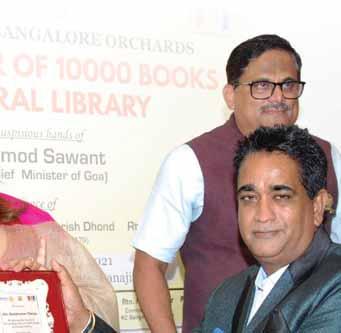

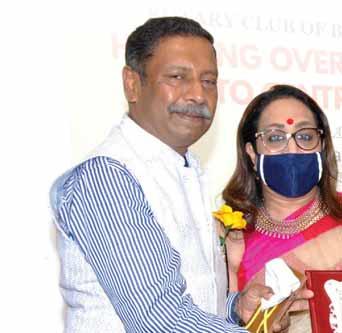
Theft is the only skill prison
inmates have. Having
served a prison term leads
to their social ostracisation.
So we are setting up a
skilling centre in the Central
Prison in Goa.
Ravishankar Dakoju
libraries. Similarly, about 25,000 books were distributed among several schools, orphanages, old age homes and other libraries in and around Bengaluru in RI District 3190.
For finding the right home for the remaining 11,500 books, Dakoju contacted PDG Jorson Fernandes from RID 3170, who also shares the same passion of this couple to “give back to society selflessly,” says Dakoju.
Fernandes got in touch with DGE Gaurish Dhond, RID 3170, a member of RC Panaji, the first club in Goa which was chartered in January 1963.
Dhond assured the Dakojus that Goa would be an ideal place to receive their generous gift as it is not only one of the most literate states in India, but its people also have a strong reading habit.
RC Panaji president Carlito Martins quickly responded and it was mutually agreed that these books could be distributed through the Central Library in Panaji. On Jan 30, the club’s 59th charter day, and during the official visit of RID 3170 DG Sangram Patil, it was decided to hand over the books to Panaji’s Central Library. The event was presided over by Goa chief minister Pramod
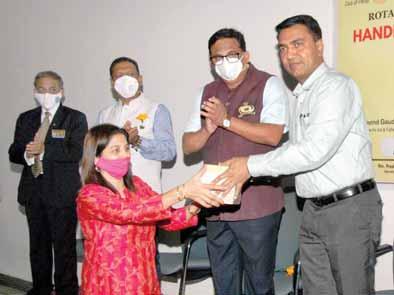
Goa CM Dr Pramod Sawant hands over a set of books to a representative of the Central Library.
Sawant, who is an honorary member of RC Panaji.
DG Patil appreciated the efforts made by RC Panaji to organise the handing over of the books and thanked the Dakojus for their gesture. The chief minister also thanked the couple and congratulated Rotarians for their selfless service to the community. He said to get maximum benefit from the generous donation of 10,500 books, they will be distributed to 11 government libraries and 140 libraries run by NGOs across the state of Goa. Rotarians from RC Bangalore Orchards led by president Narasimha Dwarkanath participated in the event.
Addressing the meeting, Dakoju said he and his wife Paola were very happy that the books had found their rightful place in a region like Goa, where the reading habit of people is relatively high. He added that earlier this month, over 1,000 books were distributed to RC Kudal.
Dakoju later told Rotary News that he has assured the Goa CM that his Foundation will be doing two more projects in Goa. The first, to be done in partnership with PDG Fernandes and RC Cuncolim, is aimed at skilling prisoners. “So many thieves are in prison because that is the only skill they have. And the fact that they served a prison term leads to their social ostracisation. So we are setting up a skilling centre in the Central Prison which is located in the CM’s constituency where the prison inmates will be trained in making files. We have also given a commitment that we will buy all the files they make.” The hope is that when the inmates return to the community after serving their term, they will have a useful vocation to make a respectable living.
Dakoju said that as building schools is close to his heart he volunteered to build a school in partnership with the government for which his Foundation would donate one acre of land. “But after a discussion, we agreed to first build a home for senior citizens. As you know, this too is a subject close to my heart. So we will be donating the land and our Foundation, in collaboration with RC Panaji and RID 3170 will build that home.”
The plan is to lay the foundation stone for this home in July at the installation of DGE Gaurish Dhond in the presence of RIPE Shekhar Mehta, he added.
Indian DGEs get lucky with IA
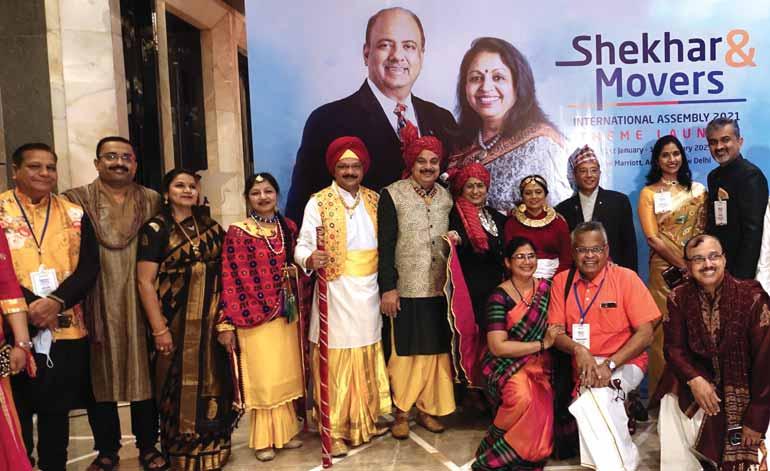
Above: The incoming governors of 2021–22 in their traditional attire. Below: From L: RIDE A S Venkatesh, RID Kamal Sanghvi and RIPE Shekhar Mehta. Right: From L: RIDEs Mahesh Kotbagi, A S Venkatesh and PDG Ravi Vadlamani.
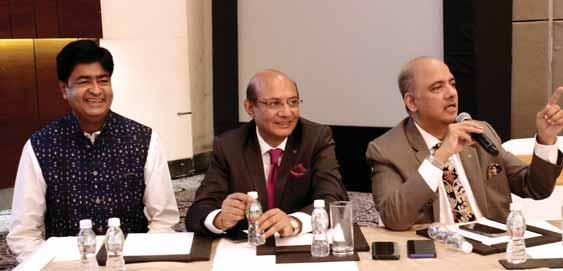
in Delhi
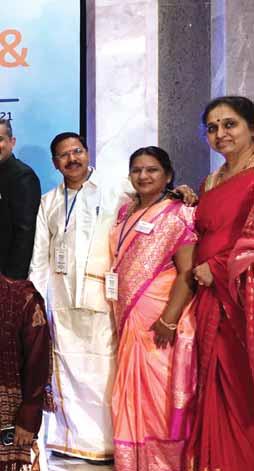
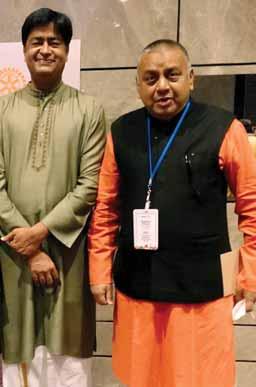
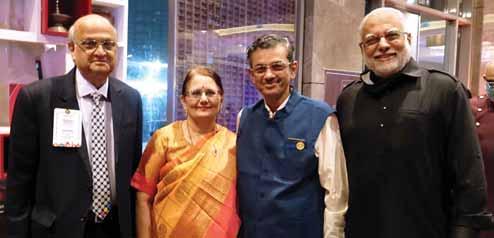
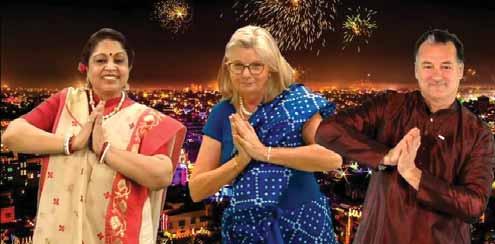
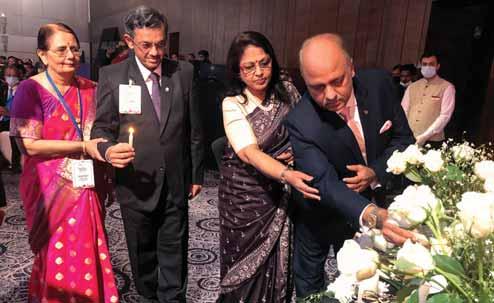
From top: From L: TRF Trustee Gulam Vahanvaty, Madhavi, RID Bharat Pandya and PRID Manoj Desai. Rashi Mehta with Susanne Knaack and Rtn Nick Krayacich, spouse of RIPN Jennifer Jones. RIPE Shekhar Mehta inaugurating the IA in the presence of Rashi, RID Bharat Pandya and Madhavi.
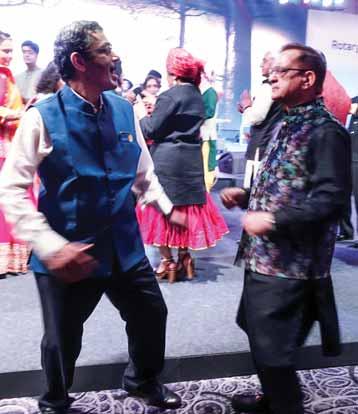

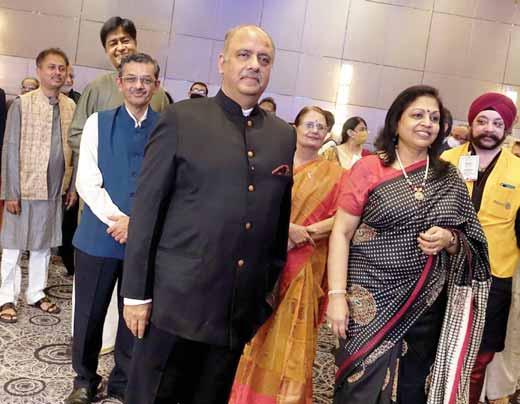
Above: RI leaders on a procession.

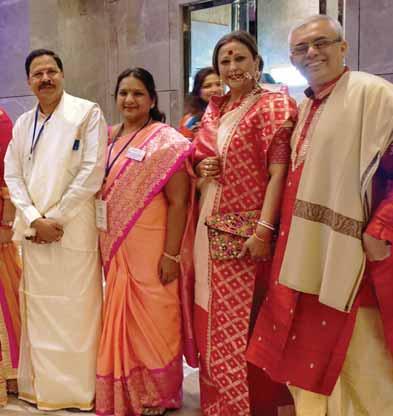

Above from left: RID Pandya shakes a leg with PDG Ranjan Dhingra; DGEs with their spouses; RIPE Mehta followed by Rashi and Madhavi lead the delegates for the IA celebrations.
Below: DGE Dr Rajesh Anand takes a selfie with Parimaladevi and DGE K Shanmugasundaram (3203), Dr Deeshma Anand and DGE S Balaji (2981).

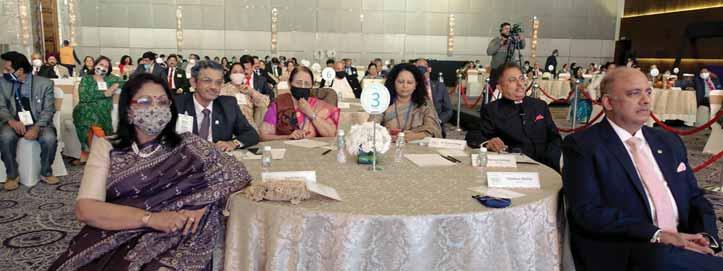
Clockwise from top: RIPE Mehta, Rashi, RID Pandya, Madhavi, Dr Amita and RIDE Mahesh Kotbagi. RIDE Kotbagi with (from L) PDGs Prashant Deshmukh (3131), Bina and Ashish Desai (3054). PDG Jitendra Dhingra (second from L) and Ritu (R) with DGE Ajay Madan and Savita (3080). PRID Manoj Desai and RIDE Venkatesh.
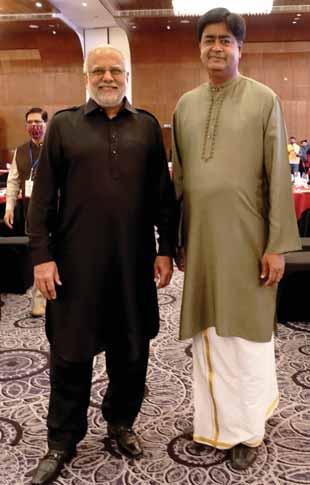

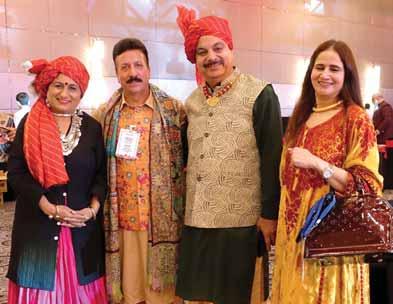
Be part of RI’s diversity, equity, inclusion policy
RI President Holger Knaack has asked Rotarians to participate in RI’s commitment to diversity and respect for all.
In 2019, the RI Board articulated a vision and commitment to advance diversity and inclusion in Rotary by adopting the Diversity, Equity and Inclusion (DEI) statement. It recently engaged PwC to develop perspectives and practices to make DEI a part of Rotarians’ shared experiences.
“As we begin this work, Rotary’s leadership is united in stating that Rotary does not tolerate speech or behaviour that promotes bias, discrimination, prejudice, or hatred because of age, ethnicity, race, colour, abilities, religion, socioeconomic status, culture, sex, sexual orientation, or gender
There is no place within
Rotary for racism,
homophobia, transphobia,
sexism, classism or ageism.
Holger Knaack RI President
Team Rotary News
identity,” said Knaack. There is no place within Rotary for racism, homophobia, transphobia, sexism, classism or ageism. “We do not believe that this is a political stance and we do believe that we should openly discuss these issues within our organisation,” he added.
Diversity is one of Rotary’s core values, and the tremendous breadth and variety of experiences, cultures, and perspectives represented in the organisation makes it unique.
The goal is to support members and participants, particularly those from communities traditionally underrepresented in the organisation, “so that they see our clubs and programmes as places where they are welcomed and encouraged to celebrate their lived experiences.”
“We know that this journey will take time and lead to challenging conversations, deep self-reflection and new opportunities for discovery and growth. We must all feel empowered to speak out respectfully and hold ourselves and each other accountable when our actions do not reflect Rotary’s ideals. Look for more opportunities to be a part of this shared journey. We want participation, input, and ideas from our members all over the globe as we strive to show what’s possible when we uphold our commitment to diversity and respect for all,” he says.
STATEMENT ABOUT OWNERSHIP
Statement about ownership and other particulars about Rotary News to be published in the first issue of every year after the last day of February 1. Place of Publication : Chennai - 600 008
2. Periodicity of its publication : Monthly 3. Printer’s Name : P T Prabhakar Nationality : Indian Address : 15, Sivasami Street Mylapore Chennai 600 004
4. Publisher’s Name : P T Prabhakar Nationality : Indian Address : 15, Sivasami Street Mylapore Chennai 600 004
5. Editor’s Name : Rasheeda Bhagat Nationality : Indian Address : 25, Jayalakshmipuram 1st Street Nungambakkam Chennai - 600 034 6. Name and address of individual : Rotary News Trust who owns the newspaper and Dugar Towers, 3rd Floor partner or shareholders holding 34, Marshalls Road more than one percent of the Egmore total capital Chennai - 600 008 I, P T Prabhakar, declare that the particulars given are true to the best of my knowledge and belief. Chennai - 600 008 sd/1st March, 2021 P T Prabhakar
Living the dreams
President-elect Shekhar Mehta isn’t afraid to make big plans. With a little teamwork, he has a way of making them a reality.
Throughout an hourlong interview with Rotary magazine, Shekhar Mehta mentions dreaming no fewer than a dozen times. Dreams about repairing broken hearts. About eradicating polio from the world. About reaching a 95 per cent literacy rate by 2026 in India, a country where 1 in 4 people can’t read.
“Dreams have to be big enough for people to be motivated to achieve them,” he says. “Gandhi once said that if you find the goal, the means will come. That’s how it’s been my whole Rotary life.”
Mehta grew up in a home committed to service; both his parents were members of Lions Clubs International. Having learned from an early age about the good that service organisations can do, when his friend Chittaranjan Choudhury asked him to become a Rotary member, Mehta readily agreed. Though only 25 years old at the time, he was quickly tapped to take on additional roles within Rotary — his motto being that if somebody asked, he would say yes. Mehta, who values the contributions of a team, would then enlist others to help.
That exemplifies his ability not only to dream big, but to get things
A Rotarian is a volunteer, and
being a volunteer means yes,
I want to do something. done. “I either have done it or have a plan for it; otherwise I won’t ask others to do it,” he says. He is a director of the India arm of Operation Eyesight Universal, a former trustee of ShelterBox (he helped build nearly 500 homes for families affected by the 2004 Indian Ocean tsunami), and the architect of a literacy programme that has reached thousands of schools. Yet he didn’t mention any of that during this interview, and when talking about accomplishments, he always says “we,” rather than “I”.
His theme, Serve to Change Lives, flows naturally from, and informs, everything he does.
With his wife, Rashi, seated next to him, Shekhar Mehta spoke with Rotary editor-in-chief John Rezek and senior staff writer Diana Schoberg in November from the Mehtas’ home in Kolkata, where Shekhar is a member of the Rotary Club of Calcutta Mahanagar. Although the discussion took place over zoom and the participants were separated by 8,000 miles, Mehta’s message and enthusiasm were as stirring and immediate as if everyone were together in the president-elect’s office at Rotary International headquarters in Evanston. By the end, everyone was thinking about how big and daring our dreams can be.
When did you realise that you could accomplish something significant in Rotary as a member?
I had a baptism by fire. I was 25 when I got admitted to my club, after a friend asked me if I’d like to join. The first month I was asked to create a souvenir publication to raise funds through the sale of advertisements. I had no clue how to do this. But I was asked, and I said OK. Many people offered to help me, and suddenly it became very successful. We raised a lot of money and everybody said, “Wow, Shekhar, well done!” Three months later, I was asked to become the editor of the club bulletin. I loved that job! If ever I were asked to do another thing at the club level, that’s the job I’d love to do. You become the nerve centre; every piece of information passes through you. You know what’s happening around the club, which was one of the reasons I got so involved.
Shortly after, we organised an artificial limb camp, where we would fit limbs for people who did not have legs and give them hand-crank tricycles. Everybody was given a job. I was given the responsibility to determine whether the recipient had enough hand or arm strength to pedal one. So I’d have the person grab my hands and I would pull.
I saw the first person coming, but he wasn’t walking, he was crawling. And as he stretched out his hand, and I stretched mine to pull his, I shuddered. I didn’t want to touch his hands; they were very soiled. The fourth person was a leper, but I had no option: I had to hold every hand. But by the seventh
Sephi Bergerson


or eighth hand, I had forgotten about my reservations and I was thinking about their plight. I think that’s when I became a Rotarian: I started feeling how others felt.
Did you seek higher levels of responsibility in Rotary or did higher levels of responsibility seek you?
I never sought anything in Rotary and I never said no to anything. This is what I keep telling everyone: A Rotarian is a volunteer, and being a volunteer means yes, I want to do something. What kind of volunteer are you if you say no?
What was your reaction when you found out you were going to become president of Rotary?
The immediate reaction? It felt nice. I didn’t jump with excitement or anything like that. Whenever responsibilities come to me, I think of them as a greater opportunity for service.
I’ll give you an example. When I was nominated to be a Rotary director, I was invited to a huge felicitation programme. These are very common in India. People come and say nice things about you, and I felt such embarrassment. I thought I needed to do extraordinary things to justify the adulation. So, that night, I wrote down what I hoped to achieve in the next two years. I was coming from a world where there are too many needs and there is a lot of opportunity to do the work. And so I sat down until four in the morning thinking of, say, opening 50 eye hospitals in India, of doing 5,000 heart surgeries for children. One of the former presidents of India, A P J Abdul Kalam, used to say that dreams are not what you see when you sleep, but dreams are those things that do not let you sleep. That day his thoughts resonated with me so vividly.
People laughed when they heard what I was planning to achieve. But when you’re trying to do something extraordinary, they may laugh at you, but you’ll have the last laugh. I am happy to tell you, many of these dreams got fulfilled.
Are we going to see an exponential series of dreams during your time as Rotary president?
Absolutely. If that doesn’t happen, in my heart, I’m not a worthy president. But I also understand that when I was a Rotary director, my focus was on India. When I’m the president of Rotary, my focus has to be on the world, and Rotary is not the same around the world.
We’re an organisation that is 116 years old, which is present in more than 200 countries and geographical areas, and has 1.2 million leaders — not just Rotarians, leaders — and the legacy of nearly eradicating a disease. We have to do projects that have an impact on the national level. I come from one of the largest countries in the world, and Rotary’s work today is absolutely having an impact on the national level. It can have a national impact in Nepal, I’m aware of it. It can happen in Bangladesh, in Pakistan. And polio eradication is something we have done on the world level, with polio now endemic in only two countries.
Rotary in India had the idea to present grade school education on TV, one channel for each grade — so grade 3, channel 3; grade 9, channel 9. The telecast is the same curriculum that the child would get in school, and at the end of each lesson there’s a message that this was made possible by Rotary. This is presented to 100 mil- lion children every day; 100 million children get to hear the name of Rotary and get to know Rotary as an organisation that does good in the world.
Our plan was to do this in five and a half years. But Covid-19 provided an opportunity, the government was interested in supporting this, and what was supposed to take five and a half years, we did in so many weeks.
So when I say we can have an impact on the national level, I know we can. Rotary has the power to do it.
What are the characteristics of Rotary in India, and which of those characteristics do you think other areas of the Rotary world should adopt?
Think first from the heart, not from the mind. Imagine the people who thought we would eradicate polio, and if they had used only their minds, we’d never be able to do it. It was a crazy dream. Have you ever planned anything that would take decades? Yet we have the courage to dream of such a thing.
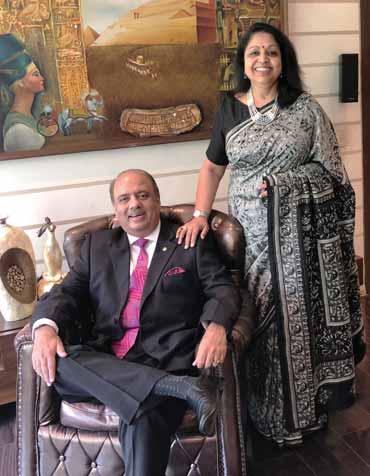
RIPE Shekhar Mehta with Rashi. Rasheeda Bhagat
We need to have the courage to take up these projects and be ready to take the risk. I am not worried about failures at all. I would rather have 10 dreams and succeed in only six of them than be a person who only has two dreams and succeeds at them both. This is not a percentage game; this is about doing good in the world. Dream big.
What do you want to accomplish in your year?
I have two broad goals. One, that our membership needs to reach 1.3 million. It’s been 1.2 million for 20 years. This needs to change, and it’s not too difficult to change it: Each member brings in just one new member. Every one of us will do that job. And yes, I will get one as well.
I’m very passionate about service. Our organisation is doing good in the world by serving people. For the coming year, the focus will be on empowering girls. We are committed to educating all children, but the focus will be a little more on girls. We will concentrate on providing toilets and all other hygiene facilities. We need to understand that girls are more vulnerable — to trafficking, especially sexual trafficking — and it is crucial that we protect them.
Is a year too short a time for the Rotary presidency?
I don’t think the president makes a lot of change to the organisation, and I don’t think the president should. And if you look at the past 10 years, it’s very difficult to say this thing happened during that year. I’m very happy you’re not able to say that, because that shows that it’s not about the president; it’s about the organisation. A president can do well to inspire the 1.2 million members to grow more and do more.
Is the Rotary presidency the best job in Rotary?
The presidency at the club level is the best job you can have in Rotary. You do far more at far greater speed as club president than you do as RI president. You get to have the pleasure of doing hands-on work.
Did you come up with your theme by yourself?
No. With me it’s always about teamwork. I love to take everybody’s views. There were about 10 of us in the room. It truly reflects my philosophy in Rotary. I wanted it to be service, but people said it should be a call to action. So service became serve. And when you do that, you change lives for the good. So the theme is: Serve to Change Lives.
What do you think will be the greatest challenge?
The only challenge, if any, will be the pandemic, because it may hamper my meeting people. I love the virtual world, because it has great advantages. But Rotary is a people’s organisation. People have to meet people. The impact I can have with an in-person meeting is much greater than when I’m just taping a message. So let us overcome Covid and meet each other as soon as possible.
Do you acknowledge that there are hopeless situations?
No, never. Nothing could be more hopeless than this pandemic, but we still find a way. I’ll give you an example. My club has 90 members, but during the pandemic we had 2,400 people at a recent regular weekly meeting. Without the pandemic, we would not have been able to do it. So, hopeless situation? No, we find opportunities there.
Rotaractors renovate Karur War Memorial
ARotaract project has enabled the residents of Karur, a historic city in Tamil Nadu, to take pride in their grand heritage. It all began at one of the weekly meetings of RAC Karur, RID 3000, when they were finalising their annual projects. “We wanted to do some additional projects that can really create an impact,” said club president R Sabarish. Following this, a four-member team visited the Karur War Memorial at Rayanur, 3km from the town, to have
V Muthukumaran
a first-hand view of this ruined structure and “in no time, we decided to renovate the entire complex,” he said.
The Rotaractors met district collector T Anbalagan with a 2D layout, 3D visualisation, walkthrough graphics and a project estimate and got formal approval for the renovation work. One of the Rotaractors, NCB Kaviarasu, an architect, came forward to design the facelift and provide technical inputs for the renovation.
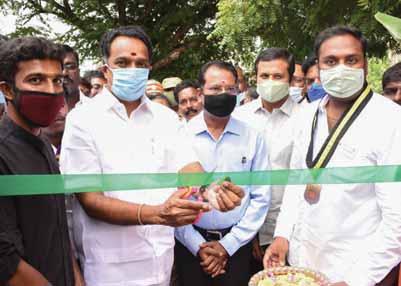
State transport minister M R Vijayabhaskar inaugurates the refurbished memorial in the presence of RAC Karur president R Sabarish (right) and district collector T Anbalagan (3rd from right).
An aerial view of the renovated Karur War Memorial.
Sabarish and his team approached Asian Fabricx who readily agreed to sponsor the entire project amounting to `3.25 lakh under their CSR arm. The main structure, the obelisk dome, got a fresh coat of paint and the entire premises measuring 846 sqft (approx) got a new makeover with steel rafters, fencing, tiling, civil work, solar lights, compound work, etc.
The wild bushes, weeds and debris were cleared and flowering plants were grown to enhance the site’s aesthetics. However, the main highlight is the erection of six pillars with inscriptions that narrate the history behind raising the War Memorial.
It was raised in memory of the soldiers killed and as a symbol of victory when the British captured the Karur Fort from Tipu Sultan during the Second Anglo-Mysore War (1780–1784 AD). “Sadly, the fort was destroyed in the battle. This memorial stands as a testimony of that ancient legacy of Karur,” said Sabarish. TN Transport Minister M R Vijayabhaskar inaugurated the renovated War Memorial on the 35th charter day of the club.
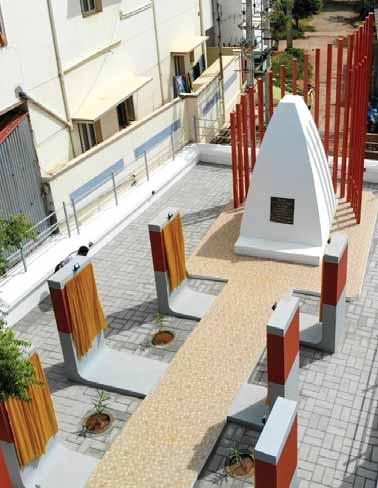
Coimbatore’s ‘gear man’ who did self less service

Amma, don’t stress yourself today. I will have breakfast and even pack my lunch from SSS,” says Ramasamy, a bank employee, to his mother as he leaves for work. This is a familiar scenario in most of the households in a locality called Singanallur in Coimbatore. SSS (Shanthi Social Services) has been a boon to the people of Coimbatore since 1996 when it was set up by the founder of Shanthi Gears P Subramanian. The sprawling facility houses a medical centre, diagnostic lab, radiology centre, blood bank, pharmacy, eyecare centre, petrol bunk and a spacious canteen. It also runs an LPG crematorium close by and has optical shops across the city.
‘Service to humanity is service to god’ had been the mantra of Subramanian, who passed away last December. So popular was this philanthropist that his obituary was run in newspapers by people at their own cost and posters depicting his charitable spirit and service propped up all over Coimbatore. Totally media shy and a very low-profile man, Subramanian shunned all publicity and awards or citations. “It is rare to see such outpouring of grief and tributes from all over for a man whom they have only heard of and not seen,” said a staff member of the SSS canteen.
But even though the “gear man” of Coimbatore has passed on, his mantra of selfless service is reflected in every service facility of SSS. Lunch is served free for at least 300 needy people while 10,000 people get food at a nominal cost each day. “I eat a full meal here every day and it costs me just `10 and dinner costs `15,” says Ibrahim Basha, an autorickshaw driver. The lunch menu includes unlimited rice, sambhar, greens, rasam, vegetable curry and buttermilk. Dinner includes varieties such as idli/dosa, sambhar, chutney; poori, subzi; vada or pongal. Tea costs `5 and coffee `10. The unhealthy refined white sugar is replaced with a healthier demerara sugar. Drinking water is dispensed from an RO unit and sanitation staff sporting grey t-shirts with the founder’s mantra printed on its back; mask and gloves in place, are quick to clean up tables unobtrusively.
The canteen serves nutritious vegetarian food in a hygienic setting. “We don’t include maida, ajinomoto or any such unhealthy ingredients, instead millets, grams, sprouts and ragi are used liberally,” says a canteen employee, adding, “our ayya (owner) was particular that only healthy food should be served. We don’t want people spending unnecessarily for treating diseases due to unhealthy diet, he would say.”
“Subramanian would often say, ‘I am only sharing with people around me what god has given me’,” says one of his closest acquaintances, a Rotarian, who does not wish to be named. “Although I knew him very well and know what a gem he was, I don’t
Jaishree

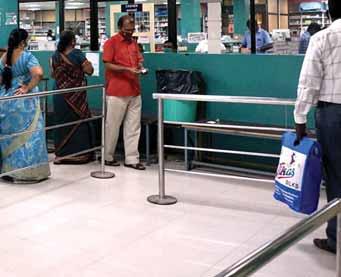
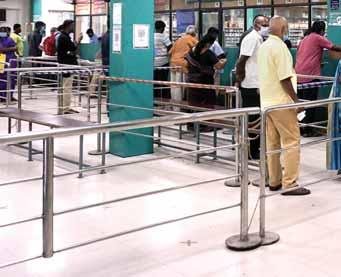
want to speak about him to the media because I respect his sentiments even after he has left us,” he adds.
The admin manager at SSS also echoes the same thought. “Our ayya was steadfast in his philosophy: What the right hand gives, the left hand need not know. Although people have suggested that publicising his services could inspire many others, he would still say, ‘I do this in my personal capacity. There are several others who are doing good in their communities and there is no need for one to replicate the other.’
Subramanian was a first-generation industrialist when he set up a gear manufacturing unit to cater to the textile sector in the city in 1960. This grew into a private limited company — Shanthi Gears — in 1972 after which he became popular as ‘Coimbatore’s gear man’. The company was sold to the Murugappa group in Chennai in 2012 allowing him to totally focus on SSS, his pet project, which he established in memory of his wife. Apart from his activities in the manufacturing sector, his social service activities made him a formidable personality. He stood by his policy to not accept, request or solicit donations. He was awarded Padma Shri in January this year for his outstanding contribution to trade and industry.
The trust’s other services are also as economical as the canteen without compromising on quality. “The hospital services come at a price 50–75 per cent lesser than any other in the city. The doctor charges just `30 whenever I bring my family here for consultation; I have not visited any other hospital ever,” says Basha. The crematorium services are free for the needy and at a nominal charge for others. Medicines are sold at 30 per cent less than the market price. SSS provides educational aid to meritorious students, supports government schools and construction of roads.
The balvadi that SSS runs provides nutritious food and teach values to children. Parents can leave them there as early as 7 am and pick them up as late as 8 pm. It is a boon to working parents who have nowhere else to leave their children, and it is totally free.
The petrol bunk is famous for selling fuel at the same price at which the stock was procured, despite subsequent increase in price. “‘The commission I get from purchasing the stock is sufficient and I don’t want to make unreasonable profit, he would say,” says his acquaintance, adding, “he was a karma yogi. Every day he would be in the canteen and when people appreciated him, unaware of his identity, he would just smile; but he would take critical feedback seriously and rectify the shortcoming immediately. I am truly blessed to have been in his company.”
Getting a house for rent in this locality is tough because people hardly shift from here as they are so used to benefitting from all services of their neighbourhood SSS. Even after his passing on, he lives in the hearts of thousands of people, in every single meal and in everybody’s thoughts, says Ramasamy.
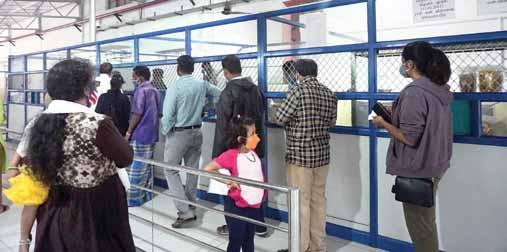
People organised in a queue to place their food orders at the canteen.





